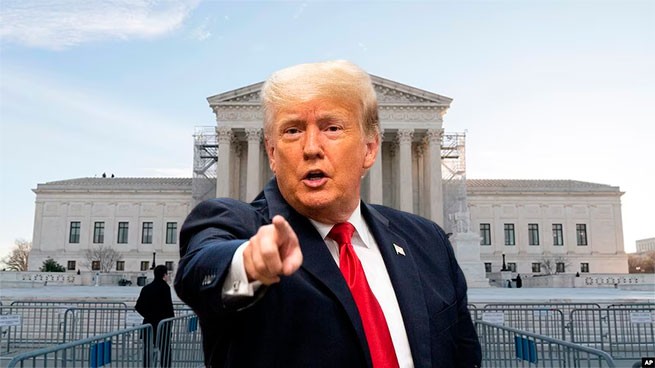The Supreme Court of the United States of America has begun hearing a case on the right of former President Donald Trump to again serve as head of state.
Trump is appealing a Colorado Supreme Court decision that ruled the former president could no longer run in the presidential primary because he incited violence against the US government.
The Supreme Court will hear arguments Thursday that presumptive Republican presidential nominee Donald Trump is ineligible to serve as president and should be removed from the Colorado ballot because of his role in the Jan. 6, 2021, attack on the Capitol.
As a reminder, Citizens for Responsibility and Ethics in Washington, or CREW, filed the lawsuit in September on behalf of six Colorado voters. The lawsuit invokes Section 3 of the 14th Amendment to the Constitution, which was ratified in 1868 to prevent former confederate officials and military personnel from returning to power after the 1861-65 Civil War.
Nine judges, three of them Trump appointees, are hearing arguments in his appeal of a lower court’s decision to disqualify the former president from the Republican primary in Colorado under Section 3 of the 14th Amendment, which bars anyone from holding office who, after taking the oath of office, then violates it. and “participated in an insurrection or rebellion.”
Trump’s lawyers argue that Section 3 does not apply to presidents, that the events of January 6 did not constitute an insurrection, and that Trump was merely exercising his right to free speech.
Trump did not attend the hearing. He plans to head to Nevada instead, according to a source familiar with his plans. Nevada will hold its nominating caucus Thursday night.
At the very beginning of the hearing, the judges questioned Trump’s lawyer Jonathan Mitchell. Conservative Chief Justice John Roberts asked Mitchell whether the state’s top election official could disqualify a candidate who admitted to participating in the insurrection.
“No, the Secretary of State cannot do that,” Mitchell replied. “Therefore, if a state were to prohibit even a recognized rebel from participating in elections, this would supplement and change the constitutional requirements for candidates for office. If a candidate is a recognized rebel, then Section 3 still allows him to run and even win the election, and then Congress can remove this restriction from him after the election.”.
The House or Senate, if a candidate is running for Congress, will have to decide for themselves “whether to keep this elected rebel in office, since each chamber is the sole judge of the qualifications of its members,” Mitchell said.
In response to a question from liberal Justice Ketanji Brown Jackson, Mitchell also said Trump was not subject to the disqualification clause because the former president is currently is not an “official of the United States”. Mitchell said such an official could only be one officially appointed.
Mitchell argues that in order to remove Trump from the elections, it will be necessary decision of the US Congress. And considering that the Republicans have a majority there…
Trump’s lawyers argued that the provision could not be enforced by the courts absent congressional approval. They also deny that Trump participated in the insurrection. “The consequences of the Colorado Supreme Court’s decision, some have argued, could be quite serious,” said conservative Justice Samuel Alito. “The Colorado Supreme Court’s decision could effectively resolve this issue for many other states, perhaps all of them.”
Earlier this week, a federal appeals court rejected Trump’s claim that he has “absolute immunity” from prosecution on criminal charges in another election interference case.
The case was brought by Special Counsel Jack Smith in U.S. District Court in Washington, resulting in four charges in connection with Trump’s widespread efforts to undermine the 2020 election.
Trump is appealing a Colorado Supreme Court decision that ruled the former president could no longer run in the presidential primary because he incited violence against the US government.







More Stories
Paris: wild clashes between police and "black" block
Modern Germans are far from the most hardworking in Europe
Georgia: Opposition leaders were brutally beaten by security forces (video)